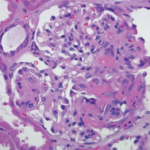This post hoc analysis of data from the PEXIVAS trial demonstrates that patients who received plasma exchange had a greater improvement in estimated glomerular filtration rate during the first two months of therapy, when compared with patients who did not receive plasma exchange. After two months, the rates of renal recovery were equivalent in both groups. Early improvements in kidney function (i.e., at four weeks) correlated with a lower risk of kidney failure within one year (relative risk 0.96, 95% confidence interval 0.95–0.97).
The meta-analysis examining plasma exchange’s impact on the risk of end-stage kidney disease among patients with ANCA-associated vasculitis has been criticized for including predominantly older studies, which may not reflect the current standard of care. However, this subgroup analysis supports the meta-analysis’s findings, indicating that plasma exchange may promote early recovery of kidney function, leading to an overall improvement in long-term prognosis. Faster resolution of glomerulonephritis may also underlie the improved kidney outcomes seen in patients with ANCA-associated vasculitis treated with avacopan.5 It is notable, however, that the key observation regarding the long-term risk of kidney failure just barely reached statistical significance, and it is not clear from this study whether these benefits extend beyond one year.
3. Hypogammaglobulinemia in patients with ANCA-associated vasculitis on rituximab.
Abstract O-101: Rathmann et al.1
Rituximab is now commonly used for both remission induction and remission maintenance for patients with ANCA-associated vasculitis. However, prolonged exposure to rituximab is associated with an increased risk of common variable immunodeficiency (CVID), in which hypogammaglobulinemia leads to an increased risk of infection.
The present study identified 84 patients in southern Sweden who received rituximab for treatment of an ANCA-associated vasculitis. The incidence rate of hypogammaglobulinemia was 16.1 per 100 person-years. Hypogammaglobulinemia developed a median of 3.5 months following treatment with rituximab. Patients with low levels of IgG at baseline were more likely to develop hypogammaglobulinemia following treatment with rituximab.
For two-thirds of these patients, the hypogammaglobulinemia was mild, with an IgG level of at least 4.9 g/L. Additionally, only five patients developed severe infection associated with hypogammaglobulinemia.
This study demonstrates that although hypogammaglobulinemia is common among patients with ANCA-associated vasculitis treated with rituximab, it is typically mild and is generally not associated with serious infection. However, the researchers could not identify novel risk factors associated with severe hypogammaglobulinemia. It would have been helpful to have these data stratified by the total number of rituximab doses received, which is likely not easily ascertained from this data set. Also, although the risk of progression to CVID in this study was low, because it is irreversible, we still need evidence-based strategies to minimize the risk of developing CVID in patients who may require prolonged therapy with rituximab.

